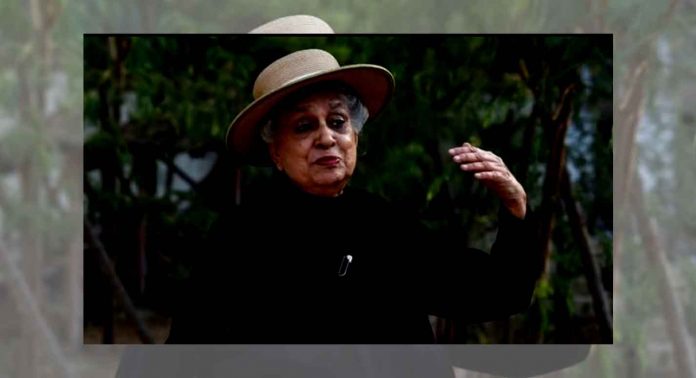Yasmeen Lari, an 82-year-old architect, is leading the charge to protect vulnerable rural populations in Pakistan from the effects of climate change.
The first female architect in Pakistan, Yasmeen Lari, has abandoned multimillion-dollar projects in the megacity of Karachi in favour of creating innovative flood-proof bamboo dwellings.
Families were able to survive the disastrous monsoon flooding that submerged a third of the country last year, thanks in large part to the few prototype communities that had already been built.
Khomo Kohli, 45, a resident of the town of Pono Colony, a few hundred kilometres outside of Karachi, stated, “We continued to live in them.”
“The remaining residents were evacuated to the road and forced to stay there for two months while the water level dropped.”
Now, Yasmeen Lari is leading a drive to expand the project to build one million homes using inexpensive local materials and provide new employment opportunities in underserved communities.
Yasmeen Lari characterised the process as “co-building” and “co-creation” because everyone involved contributed to its final form and helped make it a home for its inhabitants.
The British-educated architect is responsible for a number of Karachi’s most recognisable structures, such as the brutalist Pakistan State Oil headquarters and a series of lavish mansions.
The devastating earthquake in 2005 and the subsequent floods in 2010 prevented her from retiring from the work of the Heritage Foundation of Pakistan, which oversees her rural development initiatives.
Yasmeen Lari told AFP that she felt compelled to discover a way to empower locals to solve their own problems without relying on outside assistance.
“My motto is zero carbon, zero waste, and zero donors, which I think leads to zero poverty,” she declared.
Conventional methods
Scientists warn that as climate change makes monsoon rains heavier and more unpredictable, the need to flood-proof the country becomes more pressing, especially because the poorest people tend to reside in the most susceptible locations.
Pakistan, home to the world’s fifth-largest population, is extremely susceptible to the effects of extreme weather despite contributing less than one per cent of the world’s greenhouse gas emissions.
Pono Colony, consisting of roughly 100 homes, was established in the spring of last year, just months before devastating monsoon floods hit the region in the summer, forcing 8 million people to flee their homes.
The bamboo skeletons of the houses in the village are cut deeply into the ground, allowing them to endure pressure without being uprooted, and the raised homes are safe from the rushing water below.
The mud cottages, known as “chanwara” in the local language, are an updated version of the ancient single-room dwellings seen in the Indian states of Rajasthan and Sindh to the south.
They can be made with only readily available resources like bamboo, thatch, lime, and clay. With the right instruction, locals can put one together for about $170, or about one-eighth the price of a brick-and-mortar structure.
Almost a year after the worst floods in Sindh’s history, tens of thousands of people are still living in temporary shelters, and significant areas of agriculture are underwater.
According to a joint study by the World Bank and the Asian Development Bank, Pakistan suffered $32 billion in damage and economic losses and will need $16 billion to rebuild and rehabilitate.
Respect from the King
Yasmeen Lari remembers working on social housing in Lahore in the 1970s and being questioned by local ladies about where they might keep their hens.
As Lari explained, “Women’s needs are really at the forefront of my mind when I’m designing,” a sentiment that has stuck with her since seeing those hens.
Traditional stoves have been given a facelift and are now prominently displayed off the ground.
It was very unsanitary in the past because the cooker was probably located on the floor. “The kids would get burned on the fire, the stray animals would lick the pots, and the disease would spread,” said Champa Kanji, who has been taught by Lari’s crew to construct stoves for houses around Sindh.
Yasmeen Lari remarked, “It brings me great joy to see women gaining economic security and political voice.”
The Royal Institute of British Architects has honoured Yasmeen Lari with the 2023 Royal Gold Medal for her commitment to improving people’s lives through architectural design.
“An inspiring figure,” RIBA president Simon Allford remarked, “Yasmeen Lari transitioned from a large practice centred on the needs of international clients to focus solely on humanitarian causes.”
Yasmeen Lari remarked, “It feels great.” Of course, that means that I have more work to do. Now is the time for me to make good on my promises.
